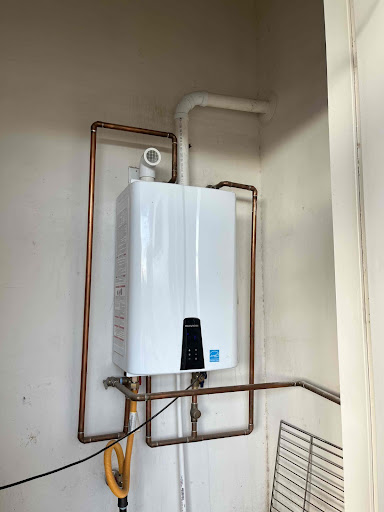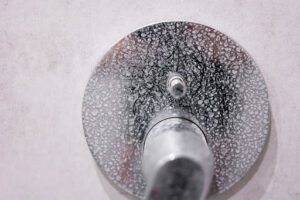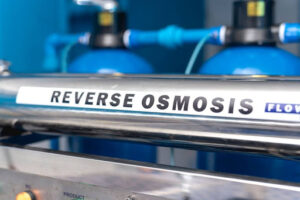Many homeowners are now considering tankless water heaters as a more energy-efficient and cost-effective alternative to traditional storage water heaters. But how does a tankless water heater work? Explore the ins and outs of these modern water heating systems, their pros and cons, and how they compare to traditional water heaters!
What Is a Tankless Water Heater?
A tankless water heater, also known as an on-demand or instant water heater, is a type of water heater that heats water directly as it flows through the unit, instead of storing heated water in a large tank. When a hot water tap is turned on, cold water travels through a pipe and into the unit, where either an electric element or a gas burner heats the water instantly. This provides a continuous supply of hot water without the need for a storage tank.
Electric vs. Gas-Fired Tankless Water Heaters
There are two main types of tankless water heaters: electric and gas-fired. Electric tankless water heaters use heating elements to heat the water, while gas-fired models utilize a gas burner. Both types are energy-efficient, but gas-fired units tend to have higher flow rates and are better suited for larger households.
How Tankless Water Heaters Work: Step by Step
- Cold water enters: When you turn on a hot water tap, cold water flows into the tankless heater.
- Water flow is detected: The unit’s flow sensor detects the incoming water flow and activates the heating process.
- Heating begins: Depending on the type of tankless water heater (electric or gas), either the electric element or gas burner heats the water as it passes through the unit.
- Heat exchanger: The heat exchanger transfers heat from the heating source to the water, rapidly raising its temperature.
- Hot water is delivered: The heated water flows out of the unit and through your pipes to the open hot water tap.
- Heating stops: Once the hot water tap is turned off, the flow sensor deactivates the heating process, conserving energy.
Flow Rate and Temperature Rise
One important factor to consider when choosing a tankless water heater is its flow rate, which is measured in gallons per minute (GPM). The flow rate determines how much hot water the unit can provide at any given time. Additionally, the temperature rise – the difference between the incoming cold water temperature and the desired hot water temperature – affects the unit’s performance. A higher temperature rise requires more heating power and may result in a lower flow rate.
Energy Efficiency
Tankless water heaters are generally more energy efficient than traditional storage water heaters because they only heat water when it’s needed. This eliminates standby heat loss that occurs with storage water heaters, which continuously heat water even when not in use. As a result, tankless water heaters can save homeowners money on their energy bills.
Pros and Cons of Tankless Water Heaters
Pros
Energy-Efficient: Tankless water heaters only heat water on demand, reducing energy consumption and lowering utility bills.
Space-Saving: Without a bulky storage tank, tankless water heaters take up less space and can be installed in smaller areas.
Continuous Hot Water Supply: Unlike storage water heaters, which can run out of hot water, tankless units provide an endless supply of hot water as long as there’s sufficient flow.
Longer Lifespan: Tankless water heaters typically last longer than storage water heaters, with an average lifespan of 20 years or more.
Cons
Higher Upfront Cost: Tankless water heaters can be more expensive to purchase and install than storage water heaters, but you can find many deals or financing options that help lower the tankless water heater cost from Phoenix plumbing companies.
Limited Flow Rate: Depending on the unit’s capacity, it may not be able to provide sufficient hot water for multiple simultaneous uses.
Complex Installation: Installing a tankless water heater can be more complicated than a traditional water heater, often requiring additional electrical or gas work.
Rite Way of Phoenix Installs the Best Tankless Hot Water Heaters
Understanding how a tankless water heater works is essential when considering this energy-efficient option for your home. By heating water on demand and eliminating the need for a storage tank, tankless water heaters provide numerous benefits, including energy savings, space efficiency, and a continuous supply of hot water. Ultimately, determining the best water heating solution for your needs will depend on factors like your household’s hot water usage, budget, and available space.
Ready to upgrade your water heater? Turn to Rite Way for a seamless tankless water heater installation in Phoenix and the surrounding areas. We carry the top brands in stock and would love to help you find the most suitable options for your home.





